Many modern scientific theories have some reference in the Quran.
This reveals that the Quran is truly a miracle and a word of God.
For e.g ORIGIN OF THE UNIVERSE
•A question that has troubled the human mind for ages!
•Explanation based on religious or scientific ideas which often contradict one another.
•However, a study of the Quran reveals that there is a fantastic inter-relationship between religion and science.
•In fact the creation is a sign of the creator, studying the creation should create a sense of humility and closeness towards Allah:
Eg. In the creation of the heavens and the earth….
•O our lord, you have not created all of this in vain..
•Science explains two possibilities:
1.STEADY STATE:
Universe is infinite
No beginning, no end
Everything has been the way it is
2. BIG BANG:
Universe has a beginning
•Perhaps an end
•Space, time and matter came into existence at an instant
•From the explosion of a compact mass called a singularity!
•All of the matter that makes up the universe is a result of that explosion.
•Most scientists, prefer this explanation because it explains all other observations better. Eg. Concept of back ground radiation and expansion of universe
The Quran
21:30
“Don’t the unbelievers see that the heavens and the earth were one unit of creation, we then split them asunder (separated them)… “
Based on this Ayat we understand that the concept of the big bang in fact has an element of truth!
(Most scientists do not agree with the steady state anymore).
FORMATION OF A SOLAR SYSTEM:
Science explains:
•Big bang – hot fragments into space
•Fragments merged with clouds of gas called nebulae
•A cooling process began – giving rise to ball like structures – planets
•Heat that was generated due to the cooling process, accumulated in the centre – heated up the central body – became the sun.
The Quran
41:11
“Then he turned to the heaven and it was smoke. So he said to it and to the earth – come you two, willingly or unwillingly – They said – we come willingly”
Following ideas confirmed by this verse:
•Presence of smoke in the initial stages of the universe (nebulae)
•Merging of the smoke and the earth (perhaps the fragments)
BALANCING THE SYSTEM:
•Formation of planets and sun is not sufficient, they have to be held in their positions for a system to come about else all would scatter in space.
Science explains:
This balance is provided by gravity. Force by which one body pulls another towards it. Thereby holding each other in place
The Quran:
55:7
“ And the sky, he raised it and set the balance”
(Gravity may be the balance that is being referred to here).
ORBITS OF THE PLANETS:
Science explains:
Planets move around the sun in orbits.This is due to gravity and also central force of the sun.
The Quran:
21:33
“He it is who created the night and the day, and the sun and the moon, all swim along, each in its rounded course.”
EXPANSION OF THE UNIVERSE:
•Quite a recent discovery by Hubble telescope that the Universe expands like a balloon.
The Quran:
51:47
“We have built the heaven with might, and verily we are expanding it.”
WILL THERE BE AN END?
Science says YES!
Expansion will not go on forever
One day gravity will overcome the expansion
This will give rise to contraction
BIG CRUNCH!
The Quran:
Many verses explain the day of judgment

WONDER OF MUSLIMS
Special thing about dis museum is the golden shrine that used to contain the cloak of the prophet Mohammed(P.B.U.H).....The Pavilion of the Holy Mantle (previously called the "Privy Chamber") was constructed by Sinan under the reign of Murad III. It holds the cloak of Mohammed(P.B.U.H), his sword, one tooth, a hair of his beard, his battle sabres, an autographed letter and other relics which are known as the Sacred Trusts. Several other sacred objects are on display, such as the swords of the first four Caliphs, the staff of Moses, the turban of Joseph and a carpet of the daughter of Mohammed.Some images of them i m posting here.....
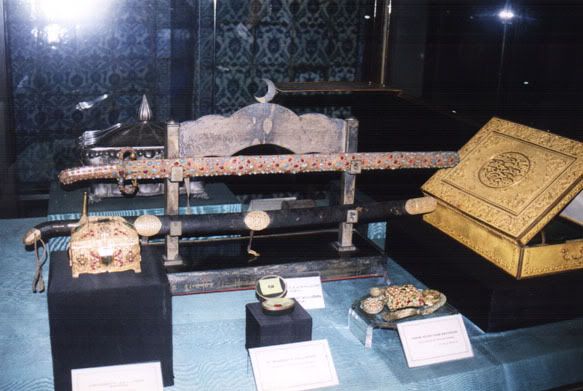
Casket containing da holy soil from da tomb of PROPHET(P.B.U.H)...
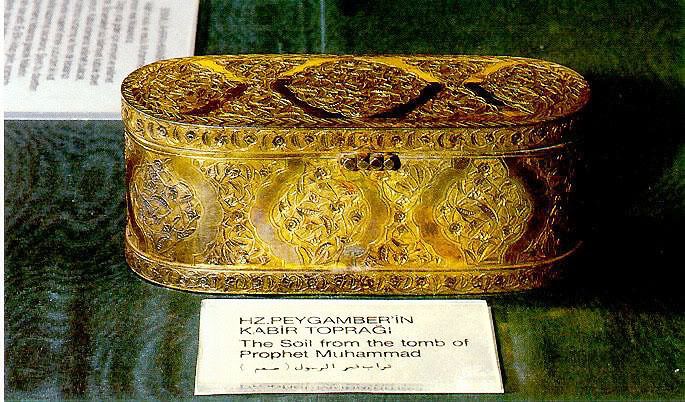

SOme HAir From DA BLesseD BEAR......
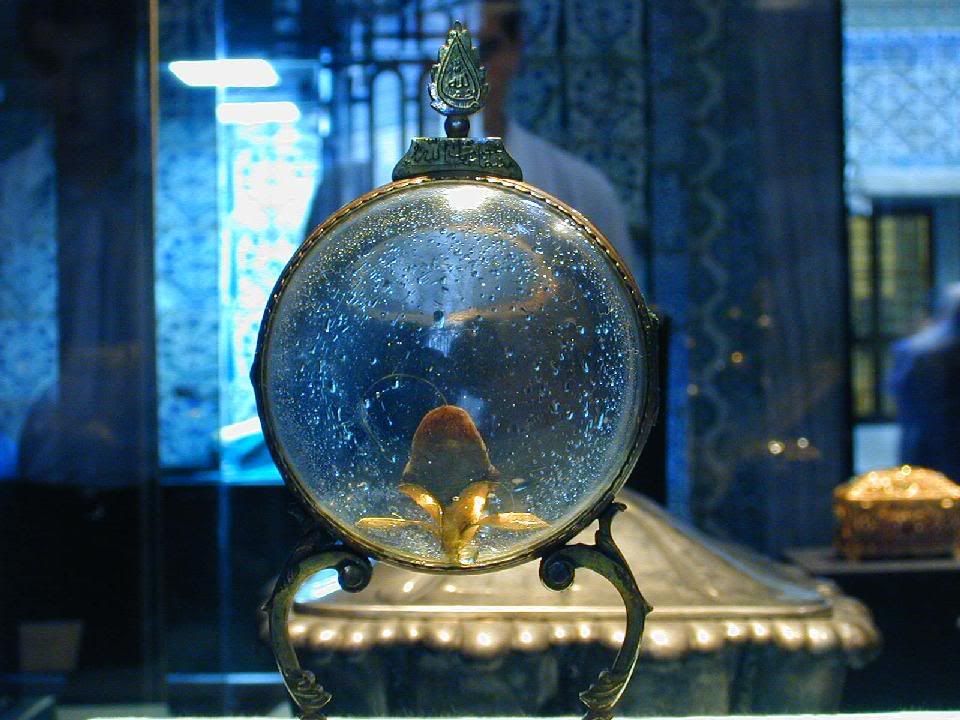
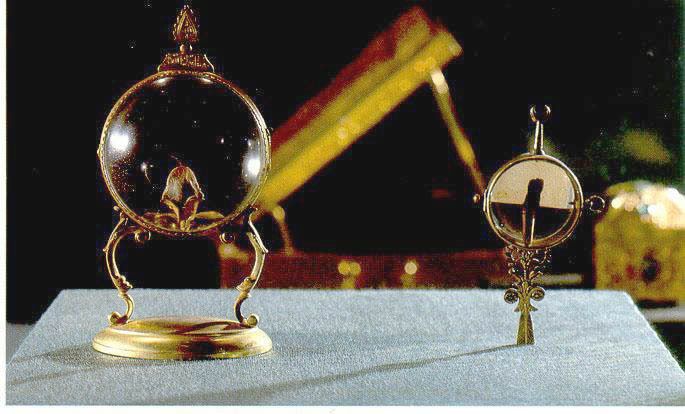
Reliquary containing da Blessed teeth(Dandan-e-saadet)of PROPHET(P.B.U.H)....
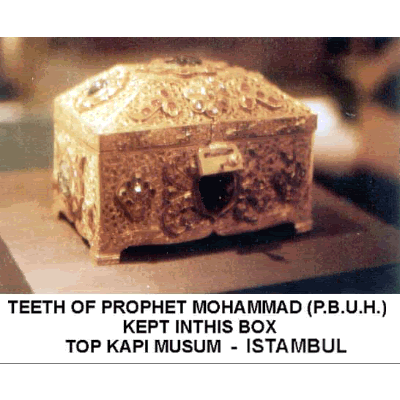
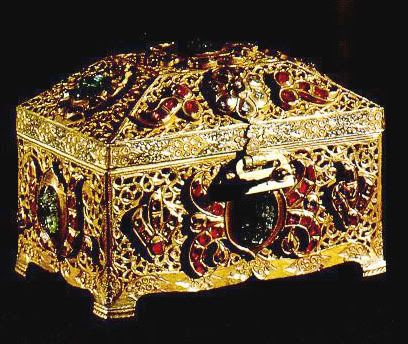
Chest (case) containing the Holy Mantle of Prophet Muhammad and the banner ((Sancak-i Serif)...(Mantle is cloak.,blanket or a form of cloth).....
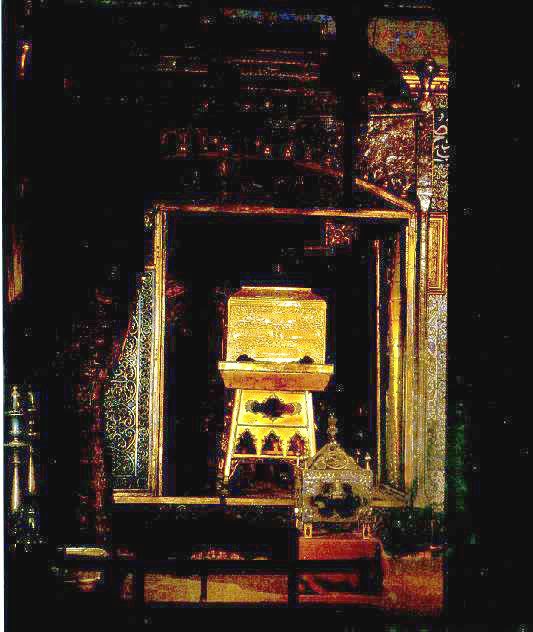
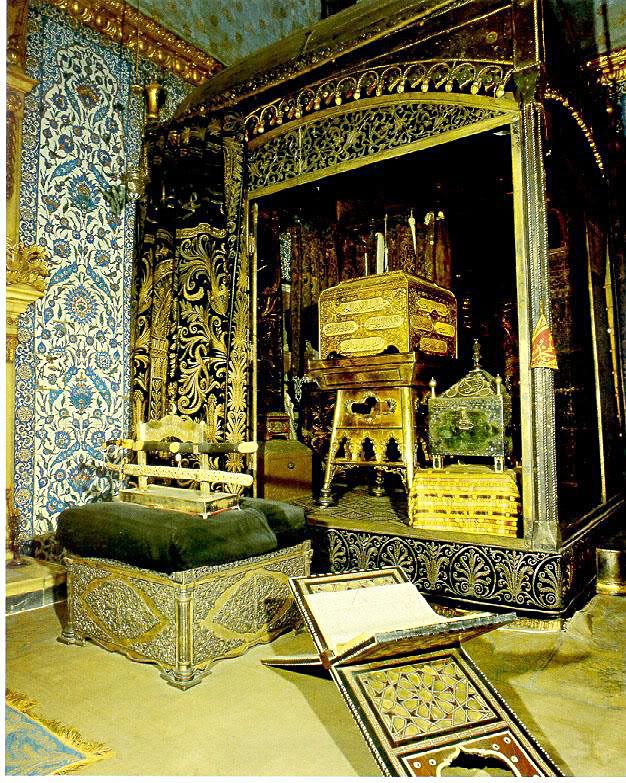
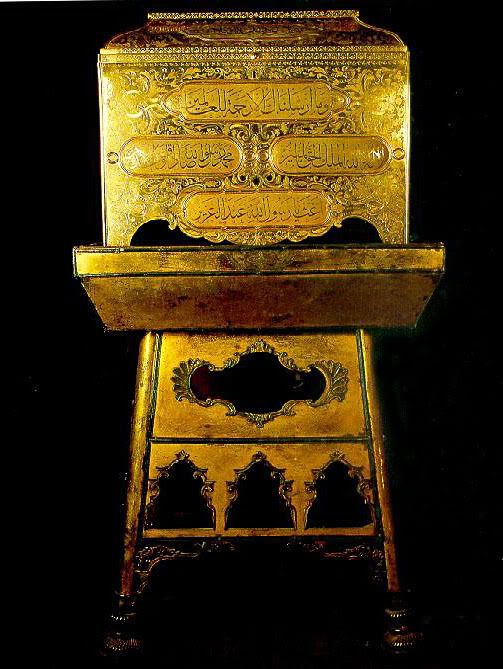
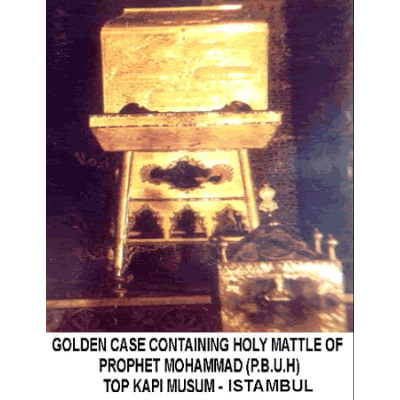
LeTTEr OF PROPHET(P.B.U.H)...
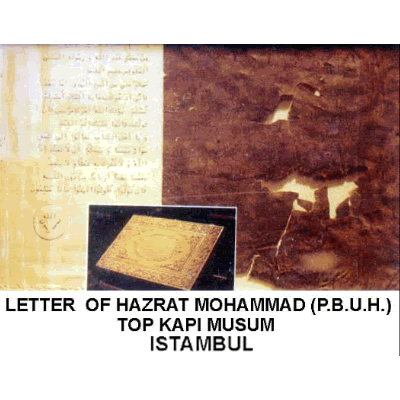
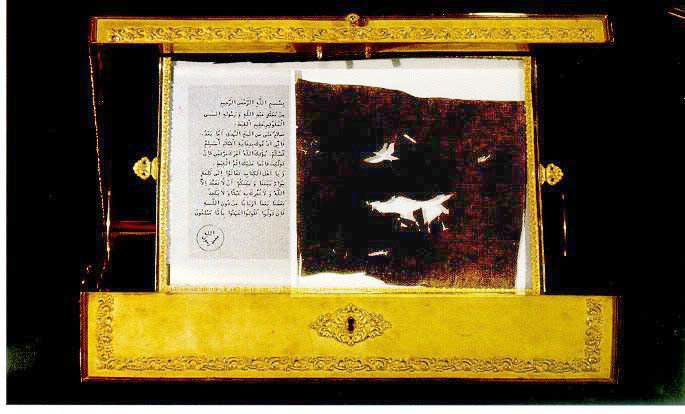
THE Blessed Footprint(Qadamgah) of PROPHET(P.B.U.H)..
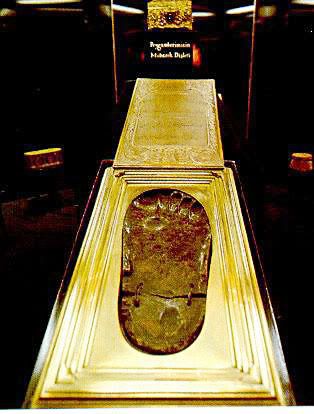
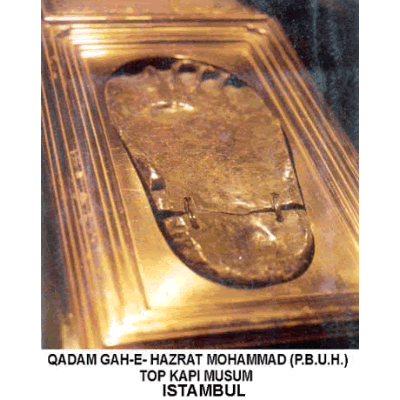
Noble Sword Of PROPHET(P.B.U.H)....
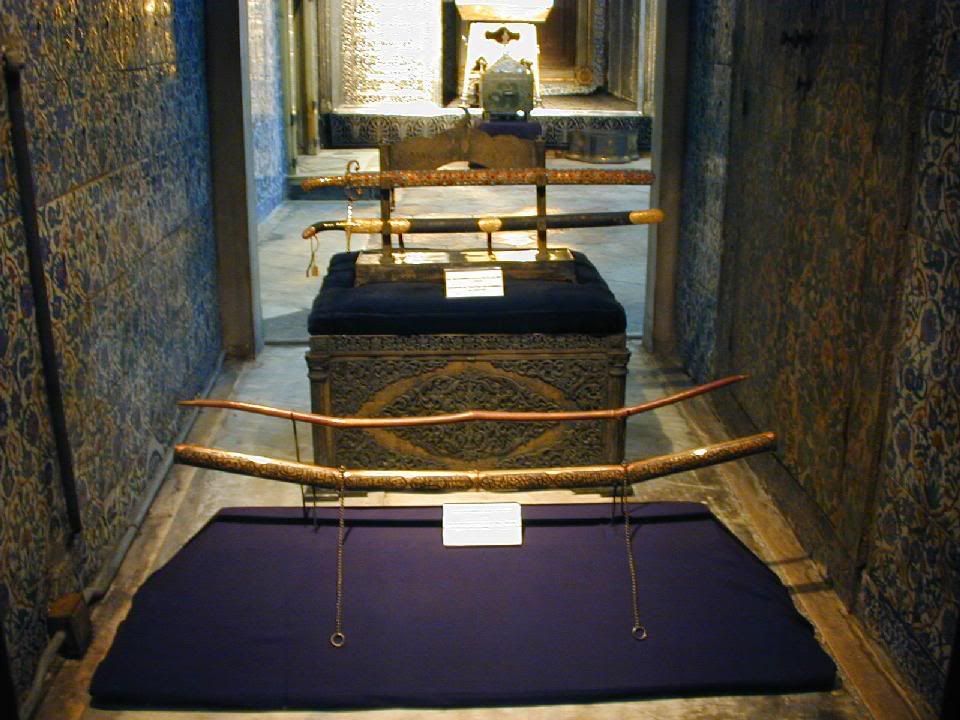
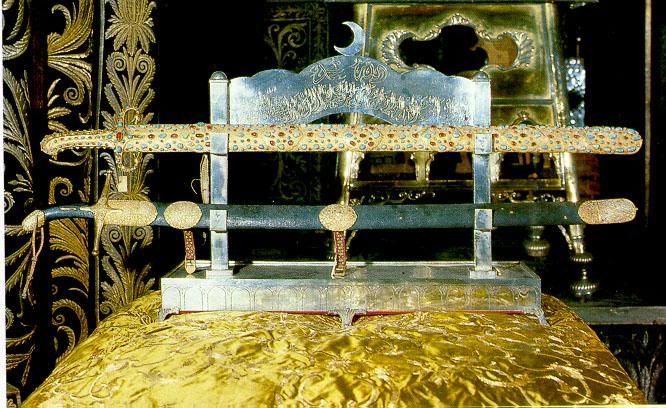
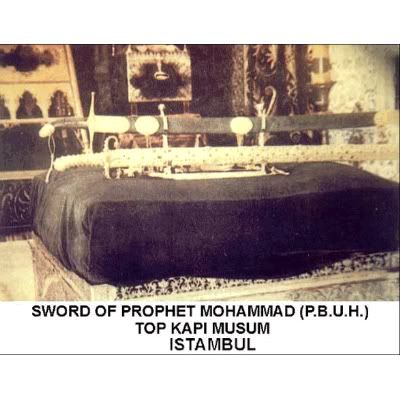
Battle sabres..(A fencing sword with a v-shaped blade and a slightly curved handle)....
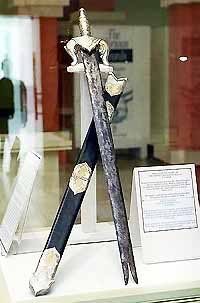
Sword COver of PROPHET(P.B.U.H)....
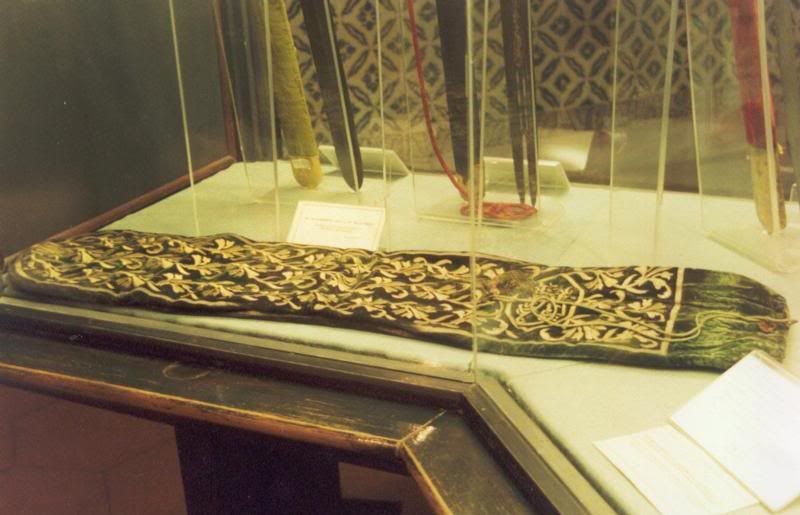
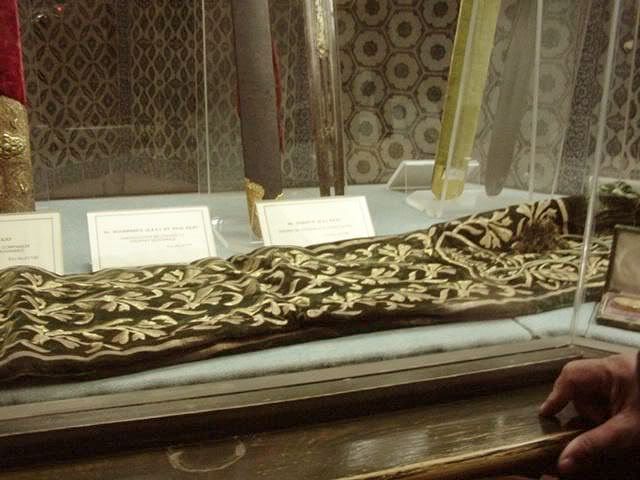
RING..
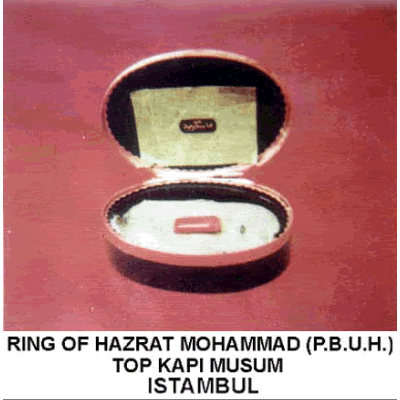
Casket containg soil from holy KAABA....
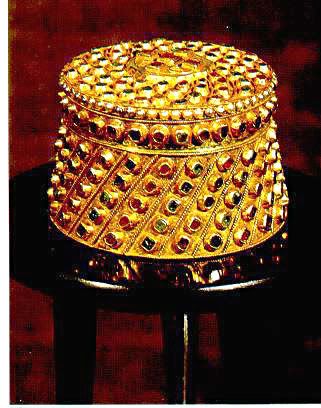
Sword of HAzrat Abu Bakar n Hazrat Usman....

SWord of Hazar Umar n Hazrat ALi.....
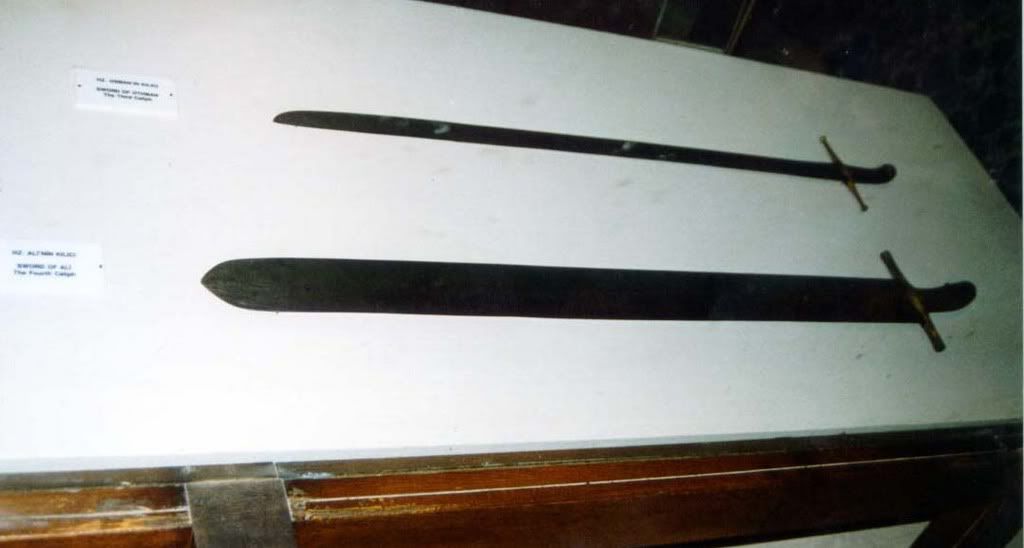
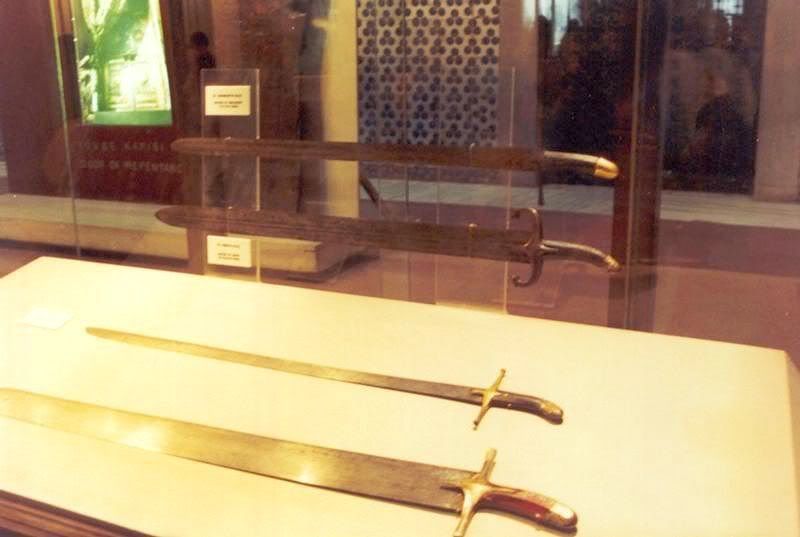
Sword OF Jaffar-e-tayyar n Khalid bin waleed.....
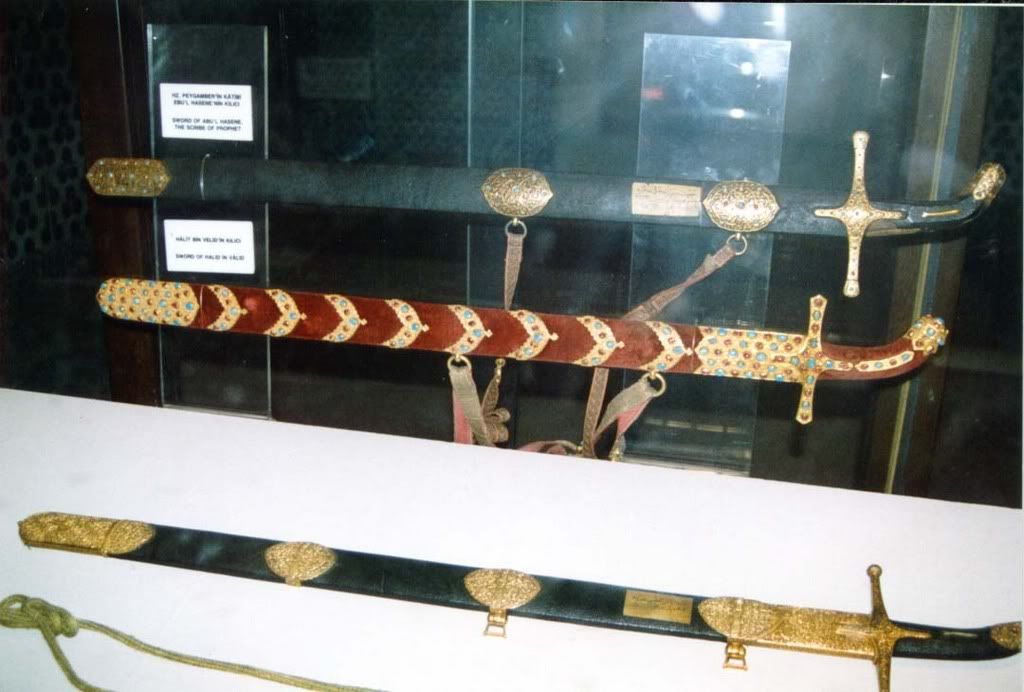

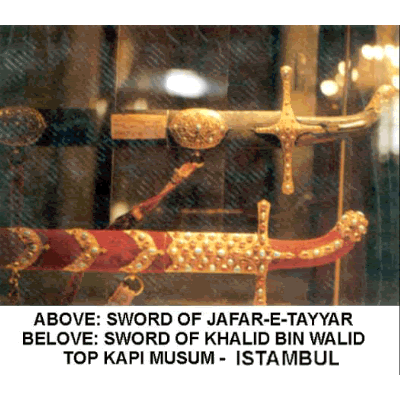
Trusting Allah
At some point in our lives, we have all had our trust betrayed. There exist few of us who trust anyone implicitly. The same goes for principles or philosophies. We have trusted them, only to be disappointed. In the same light, we have followed religious scholars, only to find that they too have betrayed us - either by being undereducated or imperfect. Maybe that is why it is so hard for us to let go of ourselves and truly trust Allah.
When we start to analyze a command, we find in it things we can not explain or fully understand, so we stop doing it or do the thing which was forbidden to us, because the opposite does not make sense to us. Let me put that in more specific terms: We know that at the 120th day of life, Allah writes for us our sustenance (risq).
Narrated Anas bin Malik: The Prophet said, "Allah puts an angel in charge of the uterus and the angel says, 'O Lord, (it is) semen! O Lord, (it is now ) a clot! O Lord, (it is now) a piece of flesh.' And then, if Allah wishes to complete its creation, the angel asks, 'O Lord, (will it be) a male or a female? A wretched (an evil doer) or a blessed (doer of good)? How much will his provisions be? What will his age be?' So all that is written while the creature is still in the mother's womb."
[Sahih al-Bukhari, 8; 77 #594]
We know that Allah has planned out our jobs and our income. Yet, we may shave our beard or take off the hijab when we go for an interview because we are afraid that we will not get a particular job. There is a huge contradiction in our beliefs here. If we know that what is for us is for us, then why are we going against Allah's orders to achieve the objective. The reason is simple. We are not trusting Allah.
This is a sad fact. Even though we know that Allah is our Lord and Protector, we have a hard time letting go and allowing ourselves to trust that He will protect us. I doubt we do this intentionally, it is shaytan, whispering to us, "The people will not understand, so shave the beard, maybe later you can grow it again" or "There is no way someone will hire you with that thing on your head, take it off."
We make excuses, like, my deen is in my heart, not what I show, even though we have been told:
Narrated 'Umar bin Al-Khattab: People were (sometimes) judged by the revealing of a Divine Inspiration during the lifetime of Allah's Apostle but now there is no longer any more (new revelation). Now we judge you by the deeds you practice publicly, so we will trust and favor the one who does good deeds in front of us, and we will not call him to account about what he is really doing in secret, for Allah will judge him for that; but we will not trust or believe the one who presents to us with an evil deed even if he claims that his intentions were good
[Sahih al-Bukhari 3;48 #809]
Even, we may leave our prayers until after they have expired because we fear being watched or something happening to us while we are praying. There is no trust that Allah will protect us, give us our risq or take care of us. We have to learn to truly trust Allah. Allah says,
When two parties from among you had determined that they should show cowardice and Allah was the guardian of them both, and in Allah should the believers trust
[Surah Ali-Imran; 3:122]
And
If Allah helps you, none can overcome you: If He forsakes you, who is there, after that, that can help you? In Allah, then, Let believers put their trust
[Surah Ali-Imran; 3:160]
It does not matter what you do, obey or disobey, the result will be that you will receive what Allah has ordained for you. You can not add to it or subtract from it. What you do is either benefit yourself with the blessings of obedience or harm yourself with the fruits of your disobedience. We have been told that what is for us can't miss us and what is not for us can't hit us.
Narrated Abdullah ibn Amr ibn al-'As: I heard Allah's Apostle (salAllahu alayhi wasalam) as saying: Allah ordained the measures (of quality) of the creation fifty thousand years before He created the heavens and the earth, as His Throne was upon water
[Sahih Muslim 32, #6416]
We have to learn to trust that Allah will take care of us when we obey Him and that He will withdrawal His Great Mercy when we disobey. Every morning the bird goes out to seek the provision Allah has given him, and every night he comes home with it. Allah has promised us our provision.
Umar Ibin Al Khattab narrated that he heard Allah's Messenger say,
'If you were to trust in Allah genuinely, He would give you provision as He does for the birds which go out hungry in the morning and come back full in the evening'
[at-Tirmidhi and Ibn Majah sahih].
Also, we need to stop thinking that having done a good where things did not work out as we expected would have turned out differently if we had done the wrong thing instead. Let us say one of us goes to an interview in hijab and then is denied the job. To assume that it was because of the hijab is wrong. We have to remember that this person can not keep Allah's Qadr from us. This interviewer can not stop what Allah wants to happen from happening.
Ibin Abbas narrated that one day he was riding behind Allah's Messenger and he said, "Young man, if you are mindful of Allah, He will be mindful of you, and if you are mindful of Allah, you will find Him before you. When you ask for anything, ask it from Allah, and if you seek help, seek help in Allah. Know that if the people were to unite to do you some benefit, they could benefit you only what Allah has recorded for you, and if they were to unite to do you some injury, they could injure you only with what Allah has recorded for you. The pens are withdrawn and the pages are dry
[Ahmad and at-Tirmidhi sahih].
Also,
Allah's Apostle (salAllahu alayhi wasalam) said:
A strong believer is better and is more lovable to Allah than a weak believer, and there is good in everyone, (but) cherish that which gives you benefit (in the Hereafter) and seek help from Allah and do not lose heart, and if anything (in the form of trouble) comes to you, don't say: If I had not done that, it would not have happened so and so, but say: Allah did that what He had ordained to do and your "if" opens the (gate for the Satan)
[Sahih Muslim, 32, #6441]
Also, we need to accept that not getting the job was indeed best for us.
Suhaib reported that Allah's Messenger said, "It is remarkable that everything turns out well for a believer while that applies only to a believer. If happiness befalls him, he gives thanks, and it turns out well for him, and if misfortune befalls him, he shows endurance (patience) and it turns out well for him
[Sahih Muslim]
We need to stop thinking that the key to the truth is only what we can understand or what we know. There is a point when we have to submit, be Muslims and say, labaik Allahuma Labaik. We have to obey without fighting it because we know that there is Justice and Mercy in it, even though we can not see it right now. When the verse of hijab was revealed, the ansar women went and immediately covered themselves.
Narrated Aisha, Ummul Mu'minin: Safiyyah, daughter of Shaybah, said that Aisha mentioned the women of Ansar, praised them and said good words about them. She then said: When Surah an-Nur came down, they took the curtains, tore them and made head covers (veils) of them.
[Sunan Abu Dawud: Book 32, #4089]
They did not analyse it, or think about how this is an oppression for women or a humiliation or anything of this sort, they obeyed. When the verse forbidding alcohol was revealed, the companions literally spat it out of their mouths. No arguing, no questioning. They trusted that Allah Knows Best. We need to stop worshipping our minds so much and start worshipping Allah more. We need to stop trusting our minds so much and trust Allah more.
Trusting in Allah means that when we hear a command, we obey it. We recognize that we are limited and that Allah has no limits. He Knows what we do not know. We do not try to explain away the commands of Allah by saying that it is for another time or another people. We don not say that what Allah has commanded for us is oppressive. We accept and obey. This is faith and trust.
Narrated Imran ibn Husayn: The Apostle of Allah (salAllahu alayhi wasalam) said: Seventy thousand people of my Ummah would be admitted into Paradise without rendering any account. They (the companions) said: Who would be those (fortunate persons)? He (the Prophet) said: Those who do not cauterise and practise charm, but repose trust in their Lord
[Sahih Muslim: Book 1, #422].
There is much reward in trusting Allah, paradise. There is sin in distrusting Him. We need to stop relying on our desires our minds our version of logic and realize that Allah is the one who Knows while we know not. Allah is the Wise, and His judgements are wise by default. Allah is the Just and His verdicts are Just by default. We can not see everything in every issue as Allah can, so why do we insist on believing that our minds can be trusted before or instead of Allah?
I pray to You, O Allah, to make us trust you and only you. May you make us of the Trusting and keep us from trusting or worshipping our minds before you.
Ameen.
Taqwah
Have you ever thought that we’ve forgotten all about death, the punishment in the grave, being accountable for our actionsand basically why we were created?
You see we have lost the fear of God (Taqwah) in our hearts. Taqwah is such a powerful tool that if one acquires it then they will never be involved in crime or meaningless actions fora million, billion, trillion years…(a long time if you know what I mean.)
So what is Taqwah all about then and how can one become God-fearing (muttaqi)? What is Taqwah? This is a question once asked by Abdullah ibn Umar (radiAllahu anhu) of Ubbay ibn Ka’ab (radiAllahu anhu). He replied:
‘...have you ever walked on a path full of thorns?’
Umar (radiAllahu anhu) replied: ‘yes I have’. Ubbay (radiAllahu anhu) asked again ‘what would you do when you are walking on such a path?’
Umar (radiAllahu anhu) answered: I will walk carefully to avoid the thorns.’
Ubbay (radiAllahu anhu) then said: ‘That is Taqwa.’
Just as a person walks carefully on apath of thorns to avoid being pricked, Taqwah causes a person to have a conscience and be careful in their daily life. To always think and question will my actions please Allah Ta'ala and are they within the shariah or will they be pleasing shaitaan?
Taqwah means ‘god consciousness’ – to remember Allah (subhanahu wa Ta'ala) is watching everything we do. That we will be questioned on the Day of judgement by Him and be accountable for every second of our lives. If one attains this high state of mind then that person is said to have Taqwah.
Stages of Taqwah
There are many stages of Taqwah, which means that for every group of people there isa different stage of Taqwah to achieve.
1. For non-Muslims it means to embrace Islam.
2. For a Muslim it means to abstain from Haram and to practise fara’iz(obligatory commands).
3. A further stage is also to avoid makruhaat (disliked actions) and to practise all kinds of Sunnah.
4. The next stage of Taqwah is to purify the heart from all kinds of evil things and to decorate it with good qualities such as to only fear Allah (Subhanahu wa Ta'ala) and to love Allah Ta'ala and His Prophet
Different forms of Taqwa
You’re probably thinking ‘it all sounds OK but how can I actually put this in to action, mate?’. You see, every organ of the body has a special form of Taqwah.The more organs of the body are steadfast on the requirements of Taqwah, the higher stage one achieves.
It does not become complete until all parts of the body stick to the commands of Shariah. So check this out:
Tongue:
Always have something good to say and try to abstain from backbiting, lying and the famous swear words. Words such as ‘al-hamdulillah, masha'Allah, jaza-kallah’ etc. should be spoken on a regular basis. Reading the Qur'an and other books of Islam regularly will help you in achieving Taqwa.
Ears:
Not to listen to dodgy music i.e. Tupac and his sixty billion ‘F’ words should be chucked in the bin for starters. Get your Talawat and nasheed tapes out and see the difference.
Eyes:
Not to lustfully gaze at the opposite sex when you’re out and about, stay away from ‘adult’ movies and magazines....if you know what I mean. Once you’ve mastered this you’re half way there.
Stomach:
Abstain from haram food and drink i.e. No booze, Big Mac, gelatine, animal fat etc.
Hands:
Not to harm anyone unjustly – in other words don’t get involved in pointless gang wars, punch ups etc. A Muslim man should not touch a non-mahram woman ... so the message isto keep your hands to yourselves lads. It’s all about self-control.
Feet:
Not to go to places of sin – pubbing and clubbing come to mind.
Heart:
Love and hate only for the sake of Allah and you will never go wrong.
Private Parts:
To abstain from adultery, fornication and other forms of sex that is unlawful.
A bit heavy isn’t it? Who d’you think I am - the Virgin Mary or something may be your reaction. Well you have to understand that to achieve the above is to achieve perfection so it will take time, effort, commitment and struggle.
The only way to achieve real Taqwah isthe way by which the Sahabah, the Tabi’een and our predecessors achieved this objective and that is through the company and guidance of a pious and spiritual guide/teacher.
The Sahabah (companions of the Prophet) achieved it from the Prophet  , the Tabi’een (generation that followed the Sahabah) achieved it from the Sahabah, the great Imams and other predecessors reached this objective from the Tabi’een. (What?*! Read theselines a couple times then you’ll get it!).
, the Tabi’een (generation that followed the Sahabah) achieved it from the Sahabah, the great Imams and other predecessors reached this objective from the Tabi’een. (What?*! Read theselines a couple times then you’ll get it!).
None of our predecessors achieved it merely through self - study. So if you want nearness of Allah and His Messenger find a guide for yourself in whose company you can achieve piety Now for many of us this is what wewould like to do but feel it is a bigstep to take at this moment in time
The Power of Iman
The popular belief is that if a young person grows up used to doing something, he or she shall grow old doing the same thing, and if he or she grows old doing that same thing, he or she will die doing it.
This belief is generally true because there is an age at which young people learn things and accept new ideas; after that a person becomes less likely to accept change and is settled in his or her behaviour.
There is, however, an exception to this general rule – and that is if iman establishes itself in the heart of a person. Everything changes and age does not pose an obstacle or difficulty.
Examples of course abound but we shall study two examples of a man and a woman whose entire outlook on life in general changed because of their iman. We shall look on some other examples and the effect of Islam and iman on them.
But first the man. He Umar ibn Al Khattab (radiAllahu anhu) who in his days of pre-Islam (Jahilliyah – religious ignorance) had such an unpredictable mind that he worshipped a god (an idol) made of sweets. One day he felt hungry and ate his idol.
It is also related that following the customs of his time, he buried a young daughter of his, alive. His daughter was removing the dust from his beard whilst he was digging her grave….his fatherhood was not even aroused by this!
But when Islam appeared and he began to hear verses of the Holy Qur'an being recited a gradual change was put into motion.
He related that he was ‘charmed’ by the words of the Holy Qur’an and one day as he was trying to convince himself that these words cannot be more than words of a poet, he overheard the Messenger of Allah (salAllahu alayhi wasalam) reciting the verses of Surat Al Haqqah saying:
"So, I do call to witness what you see and what you see not that this is verily the word of an honoured messenger. It is not the word of a poet. Little it is you believe."
Then, he thought to himself: "It must be the word of a soothsayer."
But the recitation continued:
"Nor is it the word of a soothsayer. Little admonition it is you receive. This is a Message sent down from the Lord of the Worlds."
Islam and true iman transformed this man. His mind is now free…so much so that he chopped off the tree under which the treaty of (Al-Hudaybiyeh) was signed lest people, after a while, treated it as something sacred.
And he stands facing the Black Stone in (Al-Ka'bah) saying:
"Oh Stone. I kiss you knowing that you neither benefit or cause harm. Had not I seen the Messenger of Allah kiss you, I would never have kissed you."
Of his mercy, kindness and fear of Allah stories abound; his kindness and generosity to Muslims and non-Muslims, to man and beast is best shown by this saying after he became Khlifah:
"If a mule trips in the land of the Euphrates, Allah would hold me responsible and ask me why I did not make proper pathways."
Glorified be Allah Who changes the hearts and conditions of men.
And the woman is a well-known poetess named (Al-Khansa’a) who during the period of (Jahilliyah) lost a half-brother of hers in tribal feuds, and she wrote a whole volume of poems mourning her brother (Sakhr).
She was so shocked and saddened by his death that she could not imagine life after him and even contemplated suicide as she stated in one of her poems:
"Sunrise reminds me of (Sakhr) and I remember him every sunset".
"And if it were not for the great number of mourners around me for their brothers, I would have killed myself."
Needless to say, she survived her brother’s death, married and had four male children. She became a Muslim along with her tribe, and that is when she became a changed person.
Her iman made her accompany her four young men (her four sons)on Jihad. On the eve of a decisive battle, she sat with her sons advising them and urging them to discharge their Islamic duty and stand firm against the enemy. Amongst what she said was:
"Oh my sons, you became Muslim by your own free will and emigrated by choice. You know what great rewards Allah has reserved for the Muslims who fight against the unbelievers. The House of Eternal Life is better than the House of the Temporary Life (meaning of this world). Allah, most high, says:
"Oh you who believe, persevere in patience and constancy: vie in such perseverance, strengthen each other and fear Allah that you may prosper."
"Tomorrow, go to your enemies with discerning and seek assistance and victory from Allah. When the battle is joined, go towards the heart of the enemy and fight off their leaders: you shall attain Eternal Bliss."
They fought like true believers and whenever any of them was not in the front line with his brothers, he was reminded of what their elderly mother had said. Eventually, all four men were martyred, one after the other.
When the news of their martyrdom reached their mother, she did not mourn the way she mourned her brother. In true tradition of the Believers she said:
"Praise be to Allah who has honoured me with their deaths. I trust that Allah will join me with them in His Mercy."
What strength did iman place in the arms of the youthful and diminutive Ali ibn Abi Talib (radiAllahu anhu) that enabled him to challenge the best swordsmen of Quraysh who thought no man (let alone a youth) could match their strength or fighting abilities. But, (as Allah says) "It was not you who slew them, it was Allah."
And should anyone think that this is true of people of old; let us dispel this illusion and relate stories about Believers who lived more recently. Furthermore, history shall reveal stories about other men and women of our present age whose strength and courage startles the enemies.
Most of us know the Libyan hero, Umar Al-Mukhtar, who, armed with a sword or at best, a rifle fought the war machine of the Italian army. Both he and the Believers with him cost the Italian army great losses and many casualties. He kept saying to the occupiers: " If your canon breaks my sword, your falsehood shall never break my truth."
When he was finally captured and sentenced to death, he accepted his fate with dignity and honour. Before execution, he was told: "Ask for a pardon, and we shall set you free." He refused, saying: "If you set me free, I shall fight you again!!"
And just over fifty years ago, there lived a gentle scholar named Abul Kalam A’aZad who stood in the dock of a British court, accused of incitement against British rule. In his defence, he delivered what can only be described as a historic document of thirty-six pages in which he said:
" Yes, I did say the present government is unjust. What was I supposed to say? How is it that I am required not to call things by their true names? I am a Muslim, and as a Muslim, I am obliged to stand against tyranny and to tell the people about it."
Then he went on to say:
" Tawheed is the basis of Islam, and it’s opposite is shirk, which Muslims detest. And tawheed teaches Muslims that they should only fear Allah and humble themselves to him alone…whoever fears any other, apart from Allah, is mushrik…and shirk and tawheed are never destined to meet.
From beginning to end, Islam is a call for courage and sacrifice. Death for the sake of the truth is not to be feared.
Allah (awj) says:
"And they fear none but Allah, and sufficient is Allah to call men to account." Allah (awj) also says:
"Is not Allah sufficient for his servant? But they try to frighten you with other gods besides Him. For such as Allah leaves to stray, there can be no guide"
Let the British government know that the Muslim whose Lord has commanded him to welcome death and not keep silent about the truth, is not frightened by the Indian Criminal Law No 124 and that law shall not stop him from being a Muslim and discharging his obligations.
Then he turned to the judge and said:
" As for you, judge, what else can I say to you except what the Believers before me who faced similar conditions said:
"So decree whatever you desire to decree, for you can only decree in matters relating to the life of this world."
[Holy Qur’an]
Where Does Allah Fit in the Picture?
The girls were sitting outside the mosque at a picnic bench. While they were talking, a young man passed by, and he overheard one of the girls make a complimentary comment about his looks. Now, the comment was not meant for his ears, and he did not know which of the girls had made the comment. The young man, knowing that this was inappropriate behavior and conversation for the girls, went to the father of one of the girls.
He told the man what had happened, and left it at that. Next, the father went to his daughter and asked her if she knew about this incident. She said that she did. She said she was present at the table and heard the comment, but did not know which one of them had said it. The father knew she was lying, but said nothing. He walked away, showing in his face that he was not pleased with the girl. Later, the girl was talking to this friend of mine, and related the incident. She told her how she did not know what to do because her father was angry with her. The sister looks at the girl and asks her why she lied. The girl answered that she did not want to get her friend in trouble. Now comes the part that truly made me think. So the sister said to her, "What kind of friend is worth displeasing Allah?"
She told the young girl that she had failed at all the stages of the events to remember one key question, "Where does Allah fit into the picture?" Such a simple question, but such a massive meaning. The young girl had failed to think about Allah when she was talking about boys. She had failed to think about Allah when she heard the inappropriate comment. She had failed to think about Allah when she lied to her father. All these stages could have been avoided by thinking about her personal relationship with Allah, not her relationship with each of the people who had filled her day with fitnah and sin. Her love of her friends, in this case, seemed to overshadow her love for Allah.
In a hadith Qudsi, Allah says, on the authority of Abu Sa'id (may Allah be pleased with him), who said that the Messenger of Allah (pbuh) said: Let not one of you belittle himself.
They said: O Messenger of Allah, how can any one of us belittle himself? He said: He finds a matter concerning Allah about which he should say something, and he does not say [it], so Allah (mighty and sublime be He) says to him on the Day of Resurrection: What prevented you from saying something about such-and-such and such-and-such? He say: [It was] out of fear of people. Then He says: Rather it is I whom you should more properly fear.
[Ibn Majah]
The girl had failed to put Allah into the picture. She should have changed the conversation of her friends instead of participating in it. She should have advised her friend and admonished her when she made the comment. She should never have lied. Too often we all fail to fit Allah into the picture. We need to make sure we remember that Allah is the Most Aware of what we are saying and doing and that His Great Knowledge is everywhere.
In hadith Gibriel, we see where Gibriel came to Rasool Allah and asked him several questions, among them was: "...What is Ihsan (perfection)?" Allah's Apostle replied, "To worship Allah as if you see Him, and if you do not see Him, He sees you..."
[Sahih al-Bukhari 1,2:47]
We need to consider Allah with the sure knowledge that He sees us. He knows what we are doing, saying, thinking, feeling etc... We need to make sure that the actions we make in front of Allah are those we want Him to see. Allah says, And keep up prayer and pay the poor-rate and whatever good you send before for yourselves, you shall find it with Allah; surely Allah sees what you do. [2:110].
And the parable of those who spend their property to seek the pleasure of Allah and for the certainty 'of their souls is as the parable of a garden on an elevated ground, upon which heavy rain falls so it brings forth its fruit twofold but if heavy rain does not fall upon it, then light rain (is sufficient); and Allah sees what you do. [2:265].
We need to keep thinking about Allah. We can not allow love for our family, friends or society to divert us from what is truely important:
worshipping Allah, and attaining Jannah.
Allah warns us about our devotion to the things of this life and how it diverts us from what is truly important. This diversion will lead us to an evil end while remembering Allah will bring us the greatest of blessings. Allah says, Every soul shall have a taste of death: And only on the Day of Judgment shall you be paid your full recompense. Only he who is saved far from the Fire and admitted to the Garden will have attained the object (of Life): For the life of this world is but goods and chattels of deception. [3:185].
We need to constantly remember Allah. Keep Him in the picture, you can say. We need to hold fast to our deen and use our remembrance of Allah as a way to help us be stronger. Allah says, And hold fast, all together, by the rope which Allah (stretches out for you), and be not divided among yourselves; and remember with gratitude Allah's favor on you; for you were enemies and He joined your hearts in love, so that by His Grace, you became brethren; and you were on the brink of the pit of Fire, and He saved you from it. This is how Allah makes His Signs clear to you: That you may be guided. [3:103].
The reward for remembering Allah is immense. Allah says, Surely the men who submit and the women who submit, and the believing men and the believing women, and the obeying men and the obeying women, and the truthful men and the truthful women, and the patient men and the patient women and the humble men and the humble women, and the almsgiving men and the almsgiving women, and the fasting men and the fasting women, and the men who guard their private parts and the women who guard, and the men who remember Allah much and the women who remember-- Allah has prepared for them forgiveness and a mighty reward. [33:35]
Our greatest challenge is to achieve Ihsan. It is hard to think of Allah being present when we don't see Him, but it needs to be our goal to achieve this level of faith. Another young girl I used to know told me about a school trip she took. She had decided to go with her class to a Broadway play that had been brought to her town. She knew it was not appropriate, but she just wanted to see it, to experience it. As she sat there, in the audience, while the men and women were singing and dancing on stage, she said that she suddenly became very scared. She remembered something I had taught her before. She realized that if she died in this place, she would be raised like this on the day of Judgement. She remembered Allah. She said that all she could do was pray to Allah to let her leave this place alive and to forgive her. She did not want to die here and be raised in this condition before Allah on the day of Judgement. I was so proud of her this day, for she had experienced Ihsan, recognition that Allah Sees her. I pray Allah give us all the ability to experience it and to make it a part of us. Our Prophet tells us that the more we do to please Allah, the more dear we become to Him and He to us.
Abu Huraira narrated Allah's Apostle said, "Allah said, 'I will declare war against him who shows hostility to a pious worshipper of Mine. And the most beloved things with which My slave comes nearer to Me, is what I have enjoined upon him; and My slave keeps on coming closer to Me through performing Nawafil (praying or doing extra deeds besides what is obligatory) till I love him, so I become his sense of hearing with which he hears, and his sense of sight with which he sees, and his hand with which he grips, and his leg with which he walks; and if he asks Me, I will give him, and if he asks My protection (Refuge), I will protect him; (i.e. give him My Refuge) and I do not hesitate to do anything as I hesitate to take the soul of the believer, for he hates death, and I hate to disappoint him."
[Sahih al-Bukhari 8,76:509]
O Allah, make us of those who remember you. O Allah, make us of those who love and fear you. O Allah make us of those who please you. O Allah make us of those who live and die for you. Salat wa salaam ala rasul Allah.
[Ameen.]
Subhanak Allahuma wa bihamdik (Glory & praise/gratitude is to You). O Allah, ash-hadu alla illaha illa Ant (I bear witness there is none that has the right to my worship but You), astaghfiruka wa'a tubu illaik (I ask Your forgiveness and repent unto You.)
[Ameen]
Justice in Islam
[surah Nahl; 16:90]
Thus, one of the early scholars of Islam has said that "Where the signs of Justice appear and its face is shown in any way, that is where the Law of God and His religion are found."
Justice is the first principle of social life. It can be shown to govern all relations in life: between ruler and ruled, rich and poor, husband and wife, parents and children.
Even in the ordering of an individual's personal habits, justice must be done to the respective requirements of body, mind and spirit. As we have seen, it is unjust, for example, to neglect your body and its needs in search of spiritual development.
In all Islamic instituations, justice can be seen to be operating: in the lines of congregational salat where no one has precedence over another by virtue of power, wealth or rank; in the equality of all before the law such that no one, whether ruler or criminal turned "prosecution witness", can claim immunity; in the family where no preference should be shown by a parents to one child over others and so on.
In all your dealing, you are required to stand firmly for justice even if it be against yourself and your kith and kin, for love too can lead to injustice.
O you who believe! Be firm in justice as witnesses for God, even in cases against yourselves, your parents or your kin"
[surah Nisa; 4: 135]
And if you give your word, you must be just, even though it be against your kin, and fulfil the covenant of God. For that is what He has Commanded you that you may remember."
[surah An'am; 6: 152]
The fear of committing injustice may even prevent the doing of an act that is otherwise permissible. In fact one of the derived principles of the Shar'iah is that all permissible things are permissible provided that no damage or harm results to others from their practice and that in the event that such damage or harm is suspected or confirmed, the permissible shall be prohibited to avert such damage or harm.

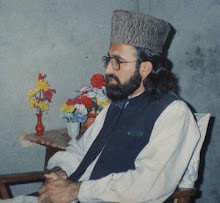
No comments:
Post a Comment